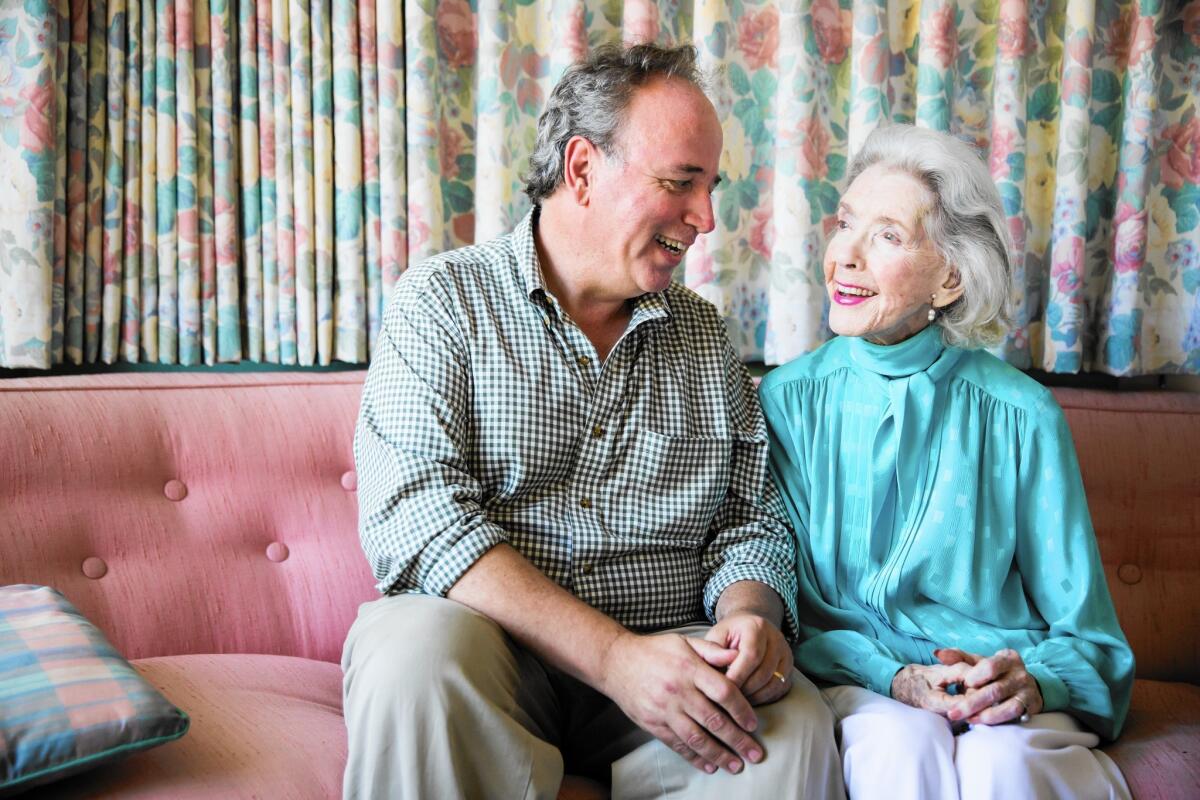Classic Hollywood: Actress Marsha Hunt survived the blacklist without apologizing for her activism

- Share via
Marsha Hunt was all of 17 when Paramount put her under contract and cast her as the female lead in her first film, “The Virginia Judge,” in 1935.
Being an actress was “the dream, the goal of my whole life and here it was,” she said recently. “I didn’t work for it. I thought I would sleep in garrets, eat cornflakes and suffer and work my way up from the bottom.”
Even as a teenager, though, Hunt had moxie. She soon grew tired of playing the “girl.” She wanted to play “real people.”
SIGN UP for the free Classic Hollywood newsletter >>
“I was someone the hero met, won, lost and had to win back,” Hunt said. “I had nothing but leads at Paramount, but not one acting role. I would go to the front office and beg for a feature role I had seen in a script. They thought I was ungrateful. They said, ‘You always get the guy in the end.’ I said I wanted to act.”
Hunt eventually got her chance to prove she was an actress when she signed with MGM. During her years there, she appeared in such films as the 1940 adaptation of Jane Austen’s “Pride and Prejudice”; 1943’s “The Human Comedy,” which was nominated for best picture; the 1943 World War II drama “Cry ‘Havoc’”; and the 1946 romantic comedy “A Letter for Evie.”
“No two roles alike,” Hunt said smiling.
Hunt is now 97. And she hasn’t let some hearing and sight issues slow her down. She’s still vibrant and beautiful, with a wonderful recall of her eight decades in Hollywood.
Though Hunt’s not making movies these days, she appears at various festivals in town to talk about her feature film work, especially in such noirs as Anthony Mann’s 1948 corker “Raw Deal,” and how her career was derailed for several years by the Hollywood blacklist despite the fact that she “didn’t know anything or care anything about communism.”
The actress also is the subject of a new documentary, “Marsha Hunt’s Sweet Adversity,” which has its world premiere Sunday at the Burbank International Film Festival.
That film’s producer-director, Roger C. Memos, first met Hunt when he was associate producer of the 2002 documentary “Darkness at High Noon: The Carl Foreman Documents,” for which she was interviewed. “Sweet Adversity” took almost a decade to complete because finding funding was difficult.
“She’s going to get the Awareness Award [at the festival] for over 70 years of activism,” said Memos, who joined Hunt for the interview at the sprawling Sherman Oaks ranch-style house the actress has lived in since 1946. (She is a former honorary mayor of the community.)
Over the years, Hunt has been involved with countless organizations and charitable endeavors, including the Valley chapter of the United Nations Assn., of which she was president; the Community Relations Conference of Southern California, of which she was a board member; and the Southern California Freedom From Hunger Committee, which she founded.
Hunt’s activism took hold during WWII. Between making movies, Hunt sold war bonds around the U.S. and appeared as a hostess on Saturday nights at the Hollywood Canteen for American servicemen.
“With weekend passes, the canteen was bursting with boys,” she said. “Every hour, they opened the doors at each end, and the thousand waiting outside would push the thousand inside out. They lined up around the block.”
Her career was riding high in 1950. She was appearing on Broadway in George Bernard Shaw’s comedy “The Devil’s Disciple” and had even landed a solo Life magazine cover.
When the play closed, she and her late husband, screenwriter Robert Presnell Jr., went to Europe. “I was Eleanor Roosevelt’s guest for dinner in Paris,” she noted. Before she had left, Hunt had been offered her own TV series by all three networks.
“I came home and there was silence,” she said.
The reason became clear very quickly. Hunt’s name appeared in the publication “Red Channels: The Communist Influence in Radio and Television,” which listed names of alleged communists or those with communist affiliations in the entertainment industry.
If your name appeared in the publication, you were deemed unemployable. “It was sent to employers, networks and ad agencies,” Hunt said. “It was like all the offers had never been made. I couldn’t believe it.”
Hunt was told she could be cleared from the blacklist if she apologized for a 1947 trip she’d made with such performers as Humphrey Bogart and Lauren Bacall to Washington, D.C., to support the Hollywood 10 — movie producers, directors and screenwriters who refused to answer questions regarding their alleged communist affiliations before the House Un-American Activities Committee.
The group, Hunt said firmly, “was so mistreated by that corrupt committee.”
The actress was informed that several of the performers had apologized for making the trip so they could keep working. Including Bogart, who declared, “I’m no Communist,” in a Photoplay article in 1948.
Hunt stuck by her guns and refused to repent.
“I said, ‘No.’ That’s an important statement I made. I’m not sorry I made it and went right on being blacklisted.”
For more Classic Hollywood, follow us on Facebook and subscribe to the newsletter
MORE:
In 1992, Martin Milner reflected on ‘Adam-12,’ ‘Route 66’
New Sue Mengers biography a colorful glimpse of Hollywood agent
How Dean Jones went from being Disney’s Mr. Nice Guy to not
More to Read
Only good movies
Get the Indie Focus newsletter, Mark Olsen's weekly guide to the world of cinema.
You may occasionally receive promotional content from the Los Angeles Times.











